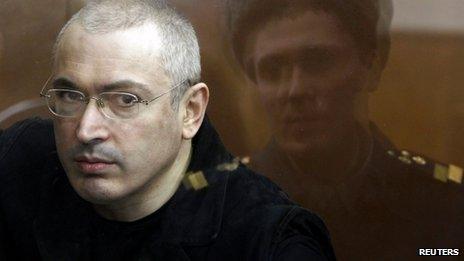Media view Khodorkovsky release as Kremlin PR exercise
- Published

Many believed that Mikhail Khodorkovsky was pardoned because he was no longer seen as a threat to Putin's regime
Russian media explain the unexpected pardoning of Mikhail Khodorkovsky as a Kremlin attempt to brush up its image ahead of the 2014 Sochi Olympics.
Influential daily Kommersant, external believes President Vladimir Putin's outspoken political opponent was forced to ask for clemency, with other papers pointing out that the former oil tycoon no longer poses a threat to the regime.
The pro-government paper Izvestiya, external, however, hails the move as a "turning point" in Russian politics.
'Minority interest'
"Putin demonstrates delicacy ahead of the Olympics," political analyst Leonid Davydov tells liberal business daily Vedomosti, external.
Talking to the same paper, another pundit, Yevgeny Minchenko says that the decision to set Khodorkovsky free is "no risk for the authorities".
"The parliamentary opposition is tamed, and opposition outside parliament does not exist," he explains.
The same opinion is voiced in popular daily Moskovsky Komsomolets, external. Putin's decision "will immensely improve the international media backdrop for the Sochi Olympics", writes Stanislav Belkovsky.
He explains that the former oil tycoon has "ceased to pose a threat to the Russian president and to the regime", as once released he "is more likely to focus on repairing the damage done to his health by imprisonment and engage in public works of a non-radical nature".
Mikhail Khodorkovsky's fate "has always been of interest to a minority of Russian citizens", argues Lev Gudkov in Kommersant, "the 25-30%... who are educated follow the news via independent sources and are therefore aware of the political context".
Forced to beg?
"Mikhail Khodorkovsky surrenders for pardon," says a headline in Kommersant, the most popular financial daily in the country.
The paper quotes sources as saying that recently Khodorkovsky had "a chat with security officials" who told him that "his mother, who has cancer, is getting worse and that a new criminal case will be launched against him very soon".
"It was that conversation, which took place without lawyers present, that prompted Khodorkovsky to appeal to the president [for clemency]," says the daily.
A similar assumption appears in heavyweight centrist broadsheet Nezavisimaya Gazeta, external. It cites a "well-informed expert" who claims that Khodorkovsky "was approached by the prison administration, who assured him that were he to write an appeal for pardon, it would be immediately granted".
Pro-government daily Izvestiya sees the decision to release Khodorkovsky as a "turning point" in the history of Russia. The paper predicts the moment will have the same significance for the country as the end of the civil wars, known as Fronde, had for France in the 17th Century.
"Our Fronde is over," declares the paper's deputy editor Boris Mezhuyev. He argues that the "symbolic" end of the confrontation in society was "marked by the amnesty given to participants in the 2011 and 2012 [anti-government] protests" and "most importantly" by the pardon granted to "the first and main leader of our local Fronde, businessman Mikhail Khodorkovsky".
Other commentators, however, are not so optimistic.
"One should not expect that Putin's decision would have a significant impact on the Russian economy," analyst Igor Nikolayev tells financial RBK Daily, external.
"It's hard to imagine that the PR impact of pardoning Khodorkovsky will heal the wounds inflicted on the economy and society a decade ago.
"Investment won't start coming back, closed down and never-started enterprises won't be reborn, and those who have emigrated won't return," says an editorial in another business paper, Vedomosti.
The daily argues that "the system established over the past decade will continue to operate", although "the system no longer fears Khodorkovsky himself", it adds.
BBC Monitoring, external reports and analyses news from TV, radio, web and print media around the world. For more reports from BBC Monitoring, click here. You can follow BBC Monitoring on Twitter , externaland Facebook, external.
- Published6 August 2013
- Published22 December 2013